After presidential term limits were repealed, in 1926, Obregon announced his intention to run again, in 1928, and formally began his campaign, in May 1927. In November, an assassination attempt was made upon his life.
Immediately, the propaganda arm of the regime’s Socialist machine blamed Catholics, even presenting detailed confessions, veracity uncertain.
They accused devout Catholic Luis Segura Vilchis (1903-27), created a police report about him as a ringleader who concocted a plan to kill Obregon and detailed how he recruited three men to help him carry out his scheme: Nahum Lamberto Ruiz, Juan Antonio Tirado Arias (1907-27) and Jose Gonzalez.
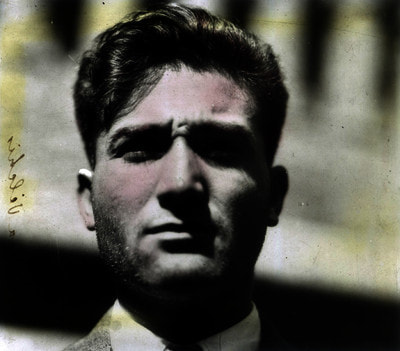 Luis Segura Vilchis
Luis Segura Vilchis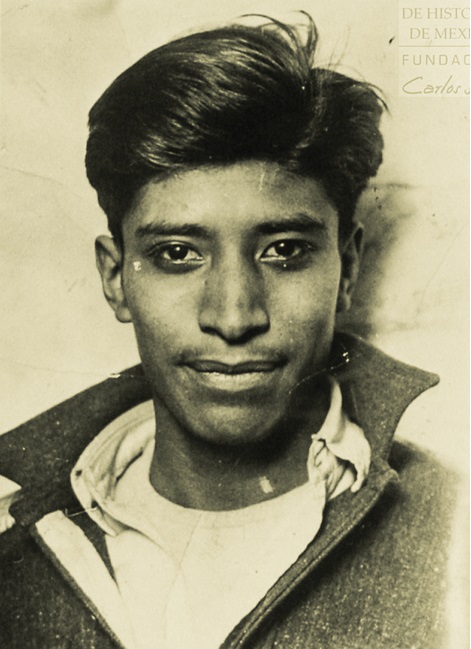 Juan Antonio Tirado Arias
Juan Antonio Tirado Arias
Authorities reported the following took place:
“Boys, we are going to try to execute Obregon to save our country. Are you willing to carry out this great work?” Segura asked.
“Yes, we are,” his cohorts affirmed.
“We are going to risk our lives, companeros,” he added. “The fate that one runs, we will all run. Do we swear to Christ?”
“Yes, by Christ, we swear it.”
“Come on, then. The time has come.”
It was November 13, 1927, a Sunday.
From the National League for the Defense of Religious Liberty, the group borrowed a car, an Essex, with a long body, square passenger cabin and wide running boards. Purchased by the priest’s brother Roberto Pro Juarez (1905-41) under a pseudonym. The car had been assigned to another brother, Humberto Pro Juarez (1903-27), to use for the activities of the League’s Advertisement Committee.
The four young men piled into the Essex, driven by Gonzalez. Segura sat shotgun, with Lamberto and Tirado in the back. They arrived at the Colonia Station and surveilled Obregon. When he traveled to his home, on 185 Avenida Jalisco, they tagged behind at a safe distance and waited while he ate. They continued to follow him when he left, escorted by bodyguards in two other cars that drove toward the Chapultepec Forest, where the presidential candidate wanted to take a walk before going to the bullfights.
As Obregon rode along the Calzada de los Filosofos, the Essex caught up to the general’s brand new, 1927 Cadillac. Segura threw a bomb that landed between two tires and broke several windows, but failed to kill the General.
The Essex fled, and Obregon’s bodyguards chased the getaway car, following close behind and firing shots.
“Don’t stick your heads out, boys, to avoid getting hit!” Segura warned during the ensuing pursuit and shootout as they drove along Avenida Chapultepec.
When the car turned onto Avenida de los Insurgentes, Lamberto stuck his head out the window and fired back, emptying the rounds in his pistol, just as a bullet pierced through one of his ears and into his brain, causing immediate loss of his eyesight.
“They got me,” he moaned, as he collapsed onto the floorboard.
When the Essex crashed into a pole, Segura yelled, “Whoever can, save yourself!” as he, Gonzalez and Tirado jumped out and escaped through the curious crowd that began to gather.
Gonzalez, quickly disappeared.
Tirado, soon caught.
Lamberto, pulled from the wreckage and transported to the Hospital Juarez de Mexico.
Segura, with a ticket in his pocket, headed for the bullfights at the Plaza de Toros de la Condesa, the 1907 Colosseum-esque, round, steel-and-cement bullring. Once there, he spotted and sat near Obregon – who had dusted himself off after the bombing and returned home for a quick change before continuing on to the arena. Obregon would later attest to seeing Segura during the bullfight.
Scrambling out of their beds, Humberto told his brother, “I want to confess,” insisting on making a Confession before they left, in custody. “Not allowed!” Basail said. “He will confess, all the same,” the priest [Miguel Pro] said, taking his brother to the back of the room, where the penitent received absolution.
In the aftermath of the attempted assassination, a police inspection officer informed Cruz, the chief police inspector, about the attack. Immediately, he began work on the case. That afternoon, he arrived at the Chapultepec Castle for instructions from Calles.
“I want a quick and thorough investigation,” the president said without even greeting Cruz.
Authorities reportedly got lucky.
Lamberto, one of the accused, blinded during the shootout, lay in his hospital bed, surrounded by a security detail.
A police agent went to his bedside and pretended to be a friend, speaking softly, whispering, as if it were dangerous if overheard; however, it was so that his voice would not be identified as a stranger’s.
On his deathbed, he naively confessed and innocently gave the names of those involved, begging his “friend” to get word to the priest and to Segura: “They need to hide, right away,” said Lamberto, who succumbed to his wounds, on November 20, 1927.
However, it was reported later by sources independent of the government that after the bullet penetrated Lamberto’s brain, he never regained consciousness.
***
On the night of the attempted assassination, two Pro brothers – Humberto and Roberto – read about the attack and decided to go into hiding. Their eldest brother, the priest, decided to go with them. Together, they found refuge in a Catholic home.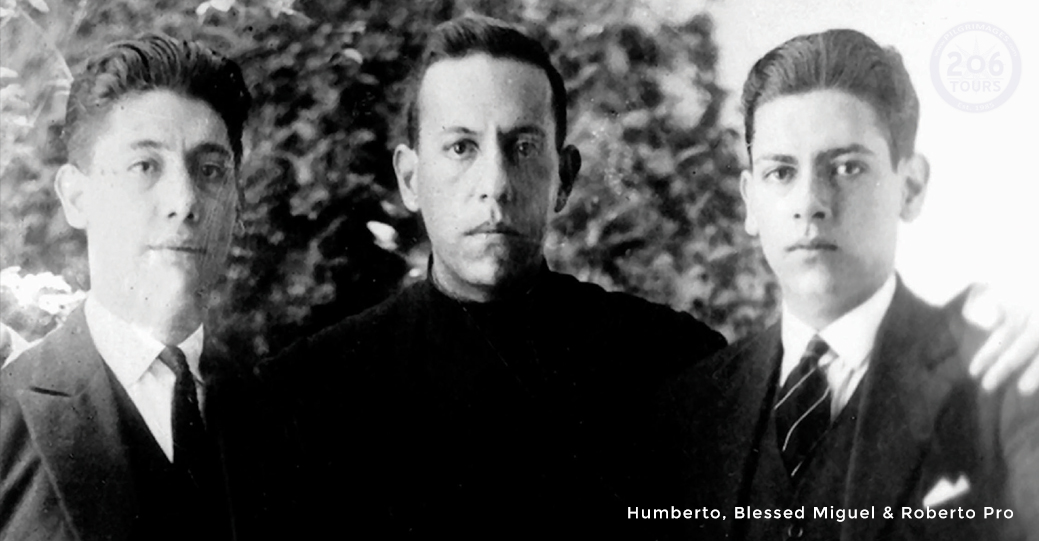
Three days after the assassination attempt, police received a tip about illegal religious ceremonies and raided the home leased to Josefina Montes de Oca, niece of Bishop Jose Maria Ignacio Montes de Oca y Obregon (1840-1921). They arrested Montes and searched the house, at 44 Calle Jose Antonio Alzate, in the suburb neighborhood of Santa Maria la Ribera. There authorities found a small, dark brown briefcase – a Mass kit with Hosts, oils, vials – that they linked to Pro, who had been boarding in the home for several months.
Authorities learned of the whereabouts of the Jesuit priest and his brothers and surrounded the house, at 22 Calle Londres, owned by Maria Valdes. At 4 a.m., police forced their way inside and searched for their suspects.
Detective Alvaro Basail Calero (1895-?) – agent with the Security Commission of the Federal District General Police Inspectorate and known for his hatred of the Church – opened a door and found the three brothers asleep in the same room.
“Don’t move!” he shouted, pointing his revolver at the men.
“From this moment on, let us offer our lives to God, for the Church in Mexico, and let us do it, all three, in such a way that God may accept the sacrifice,” he told his younger brothers.
Scrambling out of their beds, Humberto told his brother, “I want to confess,” insisting on making a Confession, receiving the Sacrament of Penance, before they left, in custody.
“Not allowed!” Basail said.
“He will confess, all the same,” the priest said, taking his brother to the back of the room, where the penitent received absolution.
“From this moment on, let us offer our lives to God, for the Church in Mexico, and let us do it, all three, in such a way that God may accept the sacrifice,” he told his younger brothers.
Leaving the house, a woman saw the Jesuit and said, “I will go see you, right away.”
“No, daughter,” he answered. “I will see you in Heaven.”
Upon their arrival in the basement jail of the Inspectorate, Humberto was placed in a cell with Montes, arrested the prior evening. Miguel and Roberto shared a cell across the room.
While in custody, each day the eldest brother led prayers, recited the rosary, bestowed blessings. On Sunday, after the Holy Mass was observed as best as could be, the incarcerated faithful sang the Jesuit anthem, “Noble Knight: Saint Ignatius of Loyola.”
***
Continuing to stitch together their narrative against the Catholics, authorities reported the following occurred:
The Monday after the assassination attempt on Obregon, Segura went to work as usual at the Mexican Light and Power Company, on Ghent Street, in the Hydraulic Department, where he was a Technical Engineer.
On Thursday, November 17, he received a visitor.
“Are you Engineer Luis Segura?” asked the visitor, Detective Basail.
“Yes, sir, to serve you.”
“I come, Engineer, with a problem; I am an agent of the General Police Inspectorate,” he said, staring at Segura, who nodded slightly. “Mr. General Cruz has entrusted me to beg you to come see him for an important matter.”
“I will gladly go, if those are the wishes of Mr. General Cruz,” he answered, smiling. “I’ll accompany you right now.”
“There is no need, Mr. Engineer; the General told me that he could wait for you until the time you wanted.”
“No, I don’t want to keep General Cruz waiting. I can leave here at any time I want, and I will go right now. I have never been in trouble with the law.”
“If you can’t go right now, Engineer, tell me what time we expect you.”
“I’m going with you right away,” he said, tidying papers on his desk before he pulled on his jacket and left with Basail.
Riding down the elevator from the third floor, Basail asked, “Are you nervous, Engineer? I’m sorry, but I’m a little shaky.”
“Yes, I always go down the stairs, because the elevator, with its rapid descent makes me a little nervous,” he answered.
At the General Police Inspectorate, Segura was introduced to Cruz.
“It’s a pleasure to meet you, Engineer. Sit down, Engineer, I’ve allowed myself to bother you to ask you some questions,” Cruz said.
“Yes, General. I am at your service.”
“Engineer, what do you know about the attack on General Obregon?”
“Well, General,” Luis began, standing, “the author, director and executor of the attempted execution of General Obregon, carried out on the 13th day, is me. Nahum Lamberto Ruiz and Juan Antonio Tirado Arias helped me carry out the plan. The Pro Juarez brothers had nothing to do with this matter."
“What the press says, General.”
“Nothing else?”
“Nothing else, Mr. General.”
“And could you tell me what you did [Sunday]?”
“I won’t be able to do it in great detail, because I don’t think it could be of any use to me, but, you see, in the morning, I went to Mass.”
“To Mass?”
“Yes, sir, to Mass.”
“Where?”
“General, you are going to allow me to keep the secret, because I know the penalty incurred by the people in whose homes where Mass is said.”
“Very well, but tell me, are you Catholic?”
“Yes, sir, Catholic, Apostolic and Roman.”
“Continue.”
“After Mass, I went home to eat, and around 2 in the afternoon I went to the bullfights. You’ll see, because here I have the ticket stub.”
He dug around in all the pockets of his jacket, until he pulled out the stub.
“The bullfight was monumental! I was close to General Obregon. I remember that they dedicated a bull to him. After the bullfight, I went to eat at a nearby restaurant, then I went home, and in the night to the theater. So, broadly speaking, that’s all.”
“And when did you find out about the attack on General Obregon?”
“Today, in the morning.”
Segura exuded confidence so much so that Cruz was convinced of his innocence. Even Obregon was certain of his innocence, and, as such, the cell door was opened. He was free to go.
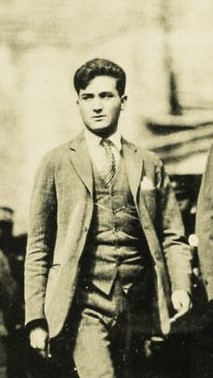 Segura
Segura
But then, while leaving, he reportedly spotted Tirado and the Pro brothers. He hesitated.
“General Cruz, you gave me your word of honor that only those responsible for the attempt to kill Obregon will be sacrificed, and that the other prisoners – who did not take part in it but are accused of being the authors and executors of it – will be released. What if I tell you the truth about this matter?”
“Yes, Engineer,” replied Cruz.
“Well, General,” Luis began, standing, “the author, director and executor of the attempted execution of General Obregon, carried out on the 13th day, is me. Nahum Lamberto Ruiz and Juan Antonio Tirado Arias helped me carry out the plan. The Pro Juarez brothers had nothing to do with this matter, since they did not know what was going to be done, nor did they take any part in what was done.”
“You make fun of me, Engineer. Your innocence is fully proven and General Obregon himself has testified in your favor. What you want is for the Pros to go free for lack of merit. You intend to save them by assuming all the responsibility yourself, so that after they are saved, you will argue that you are innocent, as it is, and also go free.”
“No, General, I do not intend to make fun of you. Yes, I want to save the Pros, because it is my duty to do so, since they have no responsibility in the attempt to execute Obregon. This is not a maneuver of mine to save them and then claim my innocence to be released. I know that my confession will cost me my life, but it is a duty of conscience for me, which surely you do not understand, to proceed like this. If you kill the Pros after you have been shown that they are innocent, then it will be your crime, and I will have no responsibility, as I would have if I did not speak. And I am serious, General, and with the truth on my lips, I’m going to show you that what I just said is absolutely true.”
Cruz asked, “But why did you try to kill my General Obregon?”
“Because he is a hypocritical persecutor of my faith, a murderer of Catholics, a traitor to the country he intends to destroy.”
“So, you don’t regret, Engineer, having tried to kill the only presidential candidate?”
“If Obregon had 20 lives, I would take 20 to save the country from such ominous oppression.”
“Go back to your prison cell!”
“Do not forget that I am the only one responsible in this matter and that I claim all the consequences for myself.” Segura said before locked up.
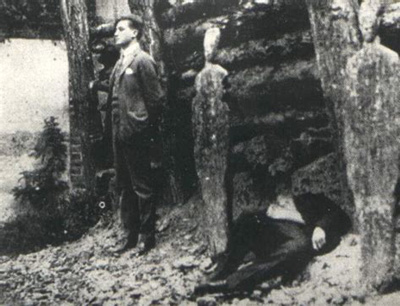 Luis Segura Vilchis ready for fire
Luis Segura Vilchis ready for fire
***
Obregon had many enemies, many political enemies. Even he believed that the attack on his life had not been by the accused Catholics, but had been conspired and carried out by political enemies.
At first, he suspected vengeful comrades of snuffed-out revolutionary generals Francisco Roque Serrano Barbeytia (1889-1927) and Arnulfo R. Gomez (1890-1927). Serrano had been assassinated on October 3, and Gomez had been executed on November 4. Obregon was suspected of ordering the hits.
Then his mind wandered to Calles and Morones. The idea that they had been behind the assassination attempt seeped inside his brain and fermented.
In an effort to uncover the truth, he sent his attorney, Arturo Orci, to visit Cruz to order a trial.
Appearing at the office of Cruz – unavailable at the time – Orci spoke with the General’s secretary, Benito Guerra Leal (1897-1960).
Requesting the official arrest report of the suspects, Guerra presented him with some papers.
After looking through the document, Orci said, “There’s no indictment on this paper. It’s just your police report.
“That’s all we have,” Guerra said.
“And what does the chief of police think about the guilt of the prisoners?” Orci asked.
“The Pro brothers have in no way admitted any complicity in the conspiracy; no such complicity has ever been proven against them.” Guerra answered, slowly and clearly, promising that a public trial would take place the next day.
***
On the eve of the execution, Calles and Cruz met in the Castle’s presidential office, seated across from one another.
“All ready?” Calles asked.
“Yes, sir. Here is the file against the alleged perpetrators of the dynamite attack.”
“Now, things have gotten serious. I don’t know what’s coming, gentlemen, but I fear nothing good. Let’s ask God for resignation and strength for what may be, and let us resign ourselves to what will happen,” the priest said.
Silence as Calles read through the file, page by page, while Cruz thumbed through an illustrated magazine.
After 25 minutes, Calles said, “Then the guilt of these individuals has been proven, and of the priest, who was the mastermind.”
Another silence as Calles stared at Cruz.
“Does it not seem more convenient for us to consign them to the judicial authorities, to a court?” Cruz asked, suggesting that the case should go to trial, to keep up legal appearances.
“No,” Calles answered crisply. “One must stop the evil in time, General Cruz. Execute them, and as soon as the order is fulfilled, come and give me an account of it.”
***
In the basement of the Police Inspectorate, the Pro brothers awaited their fates.
Earlier in the day, Cruz brought an Excelsior reporter to see the arrestees.
The priest told the reporter, “I am grateful for the attention that I have received from those who arrested me, but I am an absolute stranger to the case of the attack against Obregon. I am a friend of order, I am in peace, and I hope that justice will shine in the light of day. I deny, unequivocally, to have taken any part in the conspiracy.”
Later in the evening, of November 22, he tried to comfort his brothers: “Now, I think that we have finished the statements, I suppose that they will name a competent court and that we will be consigned to it.”
But his thinking soon changed, when, starting around 9 p.m., a changing of the guard occurred every 30 minutes. To calm themselves, the brothers prayed five decades of the rosary, and after the last decade, the priest asked for the salvation of Calles. Roberto confessed to his brother, who absolved him.
Then, all three were searched and photographed.
“Now, things have gotten serious. I don’t know what’s coming, gentlemen, but I fear nothing good. Let’s ask God for resignation and strength for what may be, and let us resign ourselves to what will happen,” the priest said.
“I cannot explain why, I feel that today anything can happen, but it doesn’t scare me, because God will help us in anything. Let us ask Him for His grace,” the priest said.
The men suffered a restless night and woke around 6 the next morning.
“I cannot explain why, I feel that today anything can happen, but it doesn’t scare me, because God will help us in anything. Let us ask Him for His grace,” the priest said.
After mounted police assembled around the building, at 8 a.m., he warned, “This morning all three of us are going to be shot. Don’t worry. Rather, let us thank God that we have been chosen. Let us renew our offering, and let us pardon our enemies.”
Around 9:30 that morning, the brothers heard the call of bugles and hustle of troops. When a police officer later arrived to retrieve the priest, he found all of them, surprisingly, in good humor.
“Miguel Pro!”
The priest heard his name called and started to leave without his sweater vest, until the officer ordered: “Put on your vest, and follow me.”
Roberto helped him put his sweater vest on, and the priest gave his brother’s hand an emotional squeeze, walked through the door and was approached by one of the police officers who had arrested him.
“I ask your forgiveness,” he begged of the priest.
“Not only do I forgive you, but I will pray for you. I thank you for the great favor you are doing me today.”
Roberto – who received a last-minute reprieve from execution – walked to the small window in his cell that peeked into the courtyard. Although boarded up, through a crack, he watched his brother walk by, escorted by two men in overcoats and fedoras.
Moments passed.
A cry from the courtyard: “Viva Cristo Rey!”
And then, a fusillade of gunshots.
***
Calles did not want the case to go to trial for a reason.
Obregon was eventually assassinated, on July 17, 1928, and Calles lived on to become the Jefe Maximo, the Top Boss, during the Maximoto (1928-34), the period immediately after his presidency, when he was the real power behind the office.
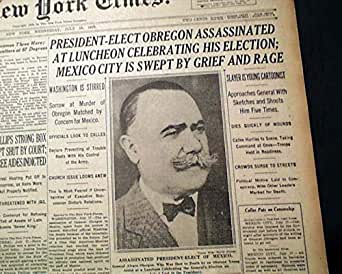
******************
This story is part 3 of a 3-part weekend series from The Remnant Newspaper.
See the first installment HERE and the second HERE.
Latest from RTV — From TRANSgenderism to TRANShumanism: How Orwell Got It Wrong
Miscellanea and facts were pulled from the following:
- “Blessed Miguel Pro, SJ,” www.jesuit.org.sg/nov-miguel-pro-sj/.
- “Calles Believed About to Renew War on Church: Blaming Catholics for attack on Obregon thought to Preface Another Religious Persecution Outburst,” by Catholic News Service.
- “El gesto, el cuerpo y la memoria: los ecos históricos de la ejecución de Miguel Pro,” by Marisol Lopez Menendez.
- “El Indio que Mato al Padre Pro,” by Julio Scherer Garcia.
- “Martyr, Blessed and Saint? Father Pro,” by Pablo Serrano Alvarez.
- “Mexican Martyrdom,” by Wilfrid Parsons, SJ.
- “Miguel Agustin Pro, Martir de la Fe,” by Enrique Mendoza Delgado.
- “The Myth of Father Pro,” by Carlos Martinez Assad.
- Theresa Marie Moreau, an award-winning reporter, is the author of Martyrs in Red China; An Unbelievable Life: 29 Years in Laogai; Misery & Virtue; and Blood of the Martyrs: Trappist Monks in Communist China.





